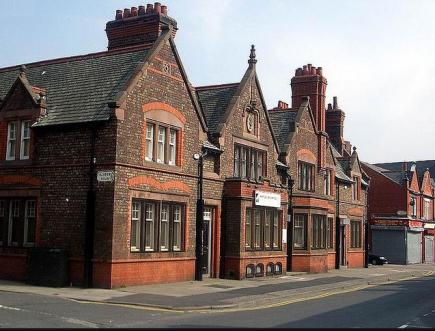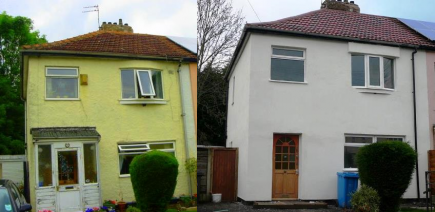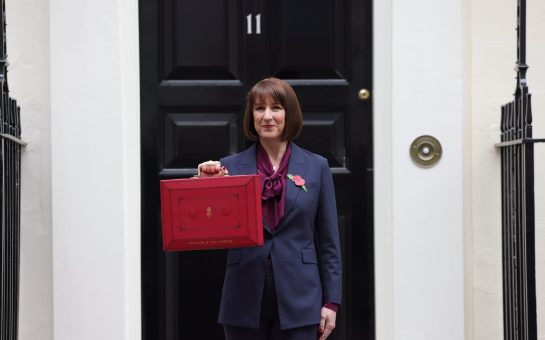Getting onto the property ladder is still tough as figures indicate that it could take someone earning the average wage in the North West more than 10 years before they could afford their own home, according to homeless charity Shelter.
The average house price in the region is now seven times more than the average annual wage in the region, compared to just four times that amount fifteen years ago.
And Shelter’s research revealed that first-time buyers in the region will have to shell out an extra third (£42,000) when purchasing their first property now than they would have if their wages had grown at the same rate.
Shelter’s chief executive Campbell Robb warned aspiring home owners of the significant challenge they face on an ordinary income, especially those without access help from the ‘bank of mum and dad’.

SECURE THE PERIMETER! You can be a guardian and live in Victorian police station (© Ad Hoc Property with thanks)
“When wages and house prices are so out of sync that first-time buyers are having to pay tens of thousands of pounds more for a foot on the ladder, it‘s a clear sign that our housing market is out of control,” he told MM.
“Millions of young people and families are facing a lifetime in expensive private renting, or stuck in their childhood bedrooms well into adulthood.”
Homeownership figures are at their lowest since 1951 and have reflected an ongoing crisis since the 2008 recession.
A substantial portion of the UK population is now privately renting with costs adding to an average of nearly 40% of their income.
The high costs mean some people are opting to live in shared accommodation or returning to live with mum and dad while saving for their first home.
However, an increasing number of aspiring property owners and investors are turning to alternate and creative solutions in order to overcome the challenges of the housing market.
Property developers Urban Splash created ‘New Islington Marina: Cotton Field’ in 2011, as part of a multi-million pound regeneration scheme to refresh the Ancoats area of Manchester.
Nestled in-between the historic and new architecture of the city, the scheme offered a place called home for a new community of canal boat dwellers to live and optimised the inter-city canal network.
Marina resident and university lecturer Douglas Field, 38, explained why moving out of his city centre flat to a canal boat was an easy choice to make.
He said: “We were paying £750 in rent per month for our city centre apartment. Ideally we wanted to live in the countryside, but the marina affords us an outdoor way of life that you don’t get in a city centre apartment.”
“Our first boat was £12,000 and 60ft in length. The payments on it meant that we would own it within 15 months.
“People are also very neighbourly here too as we’re a small community on the edge of the city.”
The Cotton Field’s community has grown over the last three years, now boasting around 30 canal boats with residents of all ages and from all walks of life, including chefs, academics, lorry drivers, couples and retirees.
And the area is still undergoing regeneration, with new housing still being developed and services introduced.
For those interested in saving at the same time as renting, ‘guardianship’ schemes could be the solution.
Guardians live in disused or vacant properties throughout the country and act as live-in security while getting a reasonable priced roof over head.
The places you could call home range from unsold vacant apartments to old schools, hospitals or even a convent, some for as little as £200 per month with bills.
Ad Hoc Property originally set up in 2005 as a security firm but since then they have expanded their services to guardianship.
This is an economical way of servicing the security needs of property owners and developers as well as providing temporary homes.
The demand for such schemes has increased in recent years due to the recession and a lack of affordable housing.
Andrew Schofield from Ad Hoc said: “Typically our client base consists of local authorities, housing associations, breweries and property developers.
“Our customers are an eclectic mix of people. We see that a large percentage of our guardians are in their early 20’s, have just got their first job and don’t want to live with mum and dad.”
“We also deal with gentlemen going through marital problems, who can’t afford the deposit elsewhere, so they come to us because it is cheaper.
“And, we get people who just love the idea of living in an old hall or sports centre, a church, you name it – we’ve got every sort of building you can think of!”
If you’re looking to invest rather than buy, then the House Crowd provides the opportunity to invest in the property market through crowdfunding.
This possible solution was dreamed up by entrepreneur Frazer Fernhead in 2012, who is now the managing director.
He is also the former director of The Armchair Investor and winner of the North West Regional Development Agency award for ‘Start Up Business of the Year’ in 2006.

BEFORE AND AFTER: 95% of House Crowd homes are in the North and most are refurbished (© The Housecrowd, with thanks)
Prospective investors can begin with a minimum of £1,000 and browse a portfolio of properties throughout the UK, along with a multitude of other investors, choosing and buying shares in properties and building their portfolio online.
This longer-term investment scheme claims to be ‘hassle free’ as an external management agency take care of administration and maintenance for you.
The project also promises that you can cash out when you need to, providing you find a buyer for your shares.
Mr Fearnhead said: “We have democratised property investment opening it up to pretty much anyone who wants to provide a better financial future for themselves.
“We appeal to a wide range of people and have clients from all walks of life – from train drivers to investment bankers.”
A whopping 95% of the House Crowd properties are in the North, most of which are refurbished.
The houses provide homes for tenants on social housing benefits, thus having a tangible social impact, but what about the return on investment?

INVESTING IN THE FUTURE: Stuart Warren used the House Crowd so he would have an extra income for his retirement
Retired music tutor Stuart Warren 65, from Grange over Sands said: “I invested with Housecrowd as I liked the idea of property investment – it’s something that’s easy to understand and you have a physical asset to fall back on.
“My pension income is low but having spare cash now means I can try to build up a fund for when I am older.”
“I have invested £75,000 spread across 71 different properties. Dividends have been paid on earlier investments as promised.
“I realise there is some risk, but I have spread it across so it is lowered. Of course an individual cannot control the housing market.”
Main image courtesy of Urban Splash with thanks.



